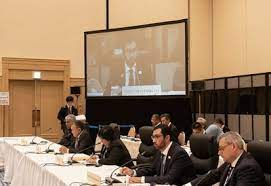Dr. Sultan bin Ahmed Al Jaber, Minister of Industry and Advanced Technology and COP28 President-Designate, while attending a joint meeting of G7 Ministers of Climate, Energy and the Environment, called on G7 nations to lead by example in making climate finance more accessible, more available, and more affordable, and to support efforts to accelerate a pragmatic energy transition.
Speaking at the event, Dr. Al Jaber noted that world was falling behind on climate commitments, necessitating a massive course correction across mitigation, adaptation, loss and damage, and finance. He reiterated that the COP28 Presidency was keen to work with the G7 to deliver transformational change across each workstream.
“To get where we need to go, everyone must pull in the same direction. We must replace polarisation with partnership, division with determination. That is why I am calling for a COP of Action, a COP of Unity, a COP of Solidarity, and a COP for All. We must act together to ignite a transformational agenda that is pro-growth, pro-climate and leaves no-one behind.”
The Ministers’ Meeting on Climate, Energy and Environment is part of a series of G7 Ministers’ meetings being held in Japan this month, under the country’s Presidency of the G7, and ahead of the Summit in Hiroshima in May. Dr. Al Jaber held bilateral meetings with ministers from India, Indonesia, Japan, Canada, France, Germany, the UK, and the US, emphasising the need for more climate finance to enable a just energy transition in emerging economies.
Dr. Al Jaber called on G7 nations to deliver a new deal on climate finance to help accelerate climate action, from mitigation and adaptation to loss and damage.
“We must make a fairer deal for the Global South. Not enough is getting to the people and places that need it most. Developed countries first need to follow through on the US$100 billion pledge they made to developing countries over a decade ago.
“On top of that, the world needs to triple the amount of money by 2030 that is available for clean tech investment, adaptation finance and a just energy transition in emerging and developing countries. The fact is that climate finance is nowhere near available, affordable or accessible enough. We need fundamental reform of international financial institutions to achieve both climate and development goals,” he said.
The COP28 President-Designate emphasised that the world was at risk of missing the mark on the Paris Agreement and overshooting climate targets. He stressed the need for an accelerated, just, and pragmatic energy transition.
“We need to triple renewable capacity by 2030 and increase it sixfold by 2040. We need smart government regulation to incentivise and commercialise viable alternatives for high-emitting sectors, like hydrogen and carbon capture technologies. And we need to continue to make the energies the world relies on today as low carbon intensive as possible, ensuring energy security is maintained during a well-managed transition.
“Let’s remember that emissions are the enemy, not energy. We need maximum energy, minimum emissions to ensure sustainable economic and social development.”
Adding that climate finance was an impediment to delivering action, Dr. Sultan Al Jaber, who traveled to Japan from the World Bank’s Spring Meetings in Washington D.C, stressed the need to reform international financial institutions and deliver on the US$100 billion promised to developing countries.
“The global south is still waiting for developed economies to make good on the US$100 billion climate finance pledge made over a decade ago. And they are rightly calling for fundamental reforms of IFIs and MDBs.”
The COP28 President-Designate underscored the need for solidarity and unity in driving climate action, adding, “The transformational progress we need will only happen through complete inclusivity.
No one can be on the side-lines. COP 28 must unite North and South, Governments and Industry, Science and Civil Society. I am counting on you to pursue the policies and take the actions needed to deliver the climate deal of the decade. Let’s keep 1.5 alive. Let’s ensure sustainable economic and social growth for all our people. And let’s keep our eye on the prize, and that is holding back emissions, not progress.”
Dr. Al Jaber also met in Tokyo this week with Japan’s Prime Minister Fumio Kishida, and the Minister of Foreign Affairs Yoshimasa Hayashi, for discussions on climate action. During the meetings, Dr. Al Jaber highlighted the importance of building on the strategic partnership between the UAE and Japan, and the two nations’ bilateral commitment to accelerating the energy transition, ahead of COP28.
The COP28 President-Designate recognised the key role that Japan has played in advancing climate action, through the establishment of the Kyoto Protocol, the first international treaty to set legally binding targets to cut greenhouse gas emissions, in 1997.
“The Kyoto Protocol represents a historic landmark in the international fight against climate change – the awakening of the need for global climate action,” Dr. Al Jaber said. “Now, COP28 in the UAE must deliver that action. The Global Stocktake will show just how far off course we are on global progress, and we will need to respond with a plan of action that is inclusive, ambitious and bold. We need a COP of Action and a COP for All.”
WAM (Emirates News Agency)



